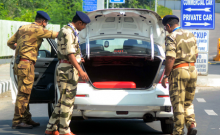The United Nations Security Council unanimously voted in favour of a resolution on Saturday to send a U.N. advance team to monitor the ceasefire between the Syrian government and armed insurgents.

The United Nations decided to send a monitoring team of 30 unarmed members to oversee the ceasefire in Syria that came into effect on Thursday after reports of re-enforcement by the Syrian government. Renewed tank and artillery firing were reported in the embattled city of Homs and also in Aleppo, killing at least five people.
The United States and the European diplomats welcomed the decision of the U.N, to deploy a monitoring team in Syria. However, they are skeptic if the Syrian government is serious in ending the civil war.
"We are under no illusions," The Washington Post quoted U.S. ambassador to the United Nations Susan E. Rice as saying. "Two days of diminished violence after a year of murderous rampage hardly proves that the regime is serious about honoring its commitments. Just today, Syrian forces resumed their brutal shelling of Homs, and shot innocent mourners at a funeral in Aleppo," she added.
The United States and its European and Arab allies managed to convince Russia to pass the resolution by toning down the terms of the proposed monitoring team of the United Nations. Russia was against the resolution that seek Syria to provide unimpeded access of the U.N. monitors throughout the country.
The proposed draft was revised on Friday to accommodate Russian objections. The new draft merely calls upon the Syrian government to guarantee full, unimpeded and immediate freedom of movement for the U.N. monitoring team.
The U.N. intends to increase the monitoring team to 250 members but it needs further approval.
Bashar Al Jaafari, Syria's envoy to U.N., assured support to the U.N. monitoring mission as long as it doesn't violate sovereignty of Syria.
Kofi Annan along with the joint United Nations and Arab League envoy to Syria submitted on March 16 a six-point peace plan to the UN Security Council to end violence in Syria caused by a year-long uprising against its president Bashar al-Assad that killed more than 9,000 people, mostly civilians.

















